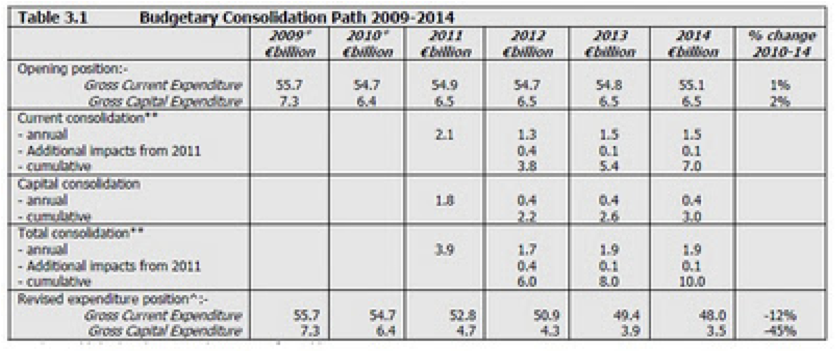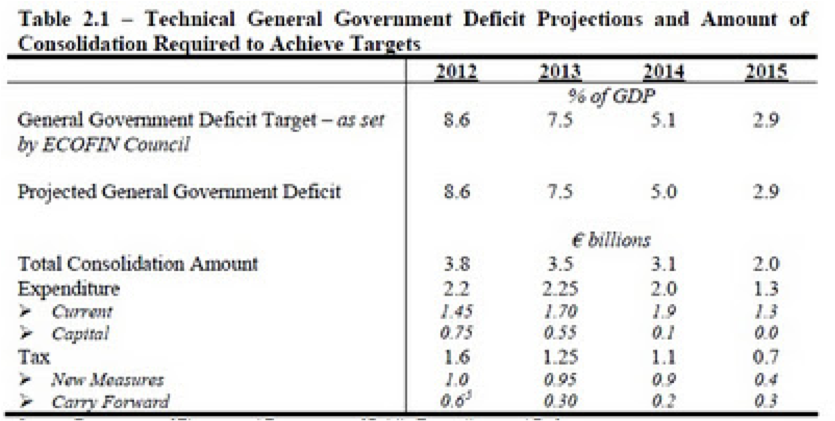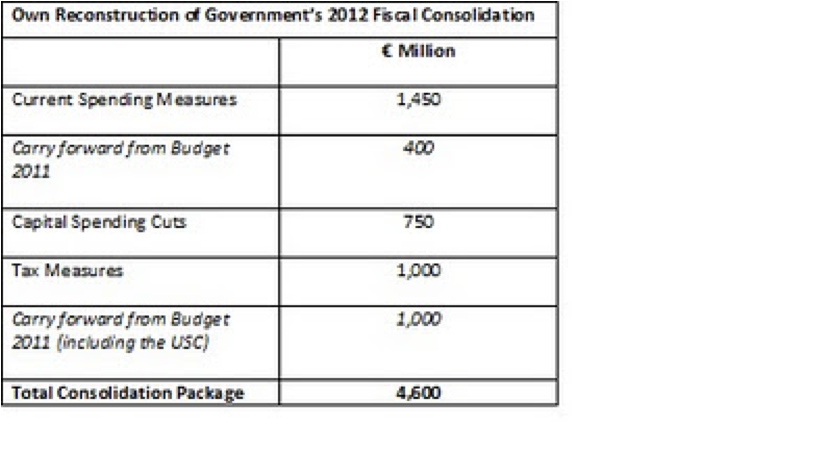Is the Government hiding more austerity?

Even more austerity may be in store for us, though the Government seems loth to come clean about its extent. By Michael Taft.
The Government may be hiding up to €800m in austerity measures in their recent Medium-Term Fiscal Statement (MTFS). I use the term “may” because documents prepared by the Department of Finance can sometimes be frustrating exercises in ambiguity. However, on any logical reading of the document, it appears there is under-the-counter austerity which the Government is not admitting to. Indeed, there may be €800m more spending cuts than is necessary to achieve the Government’s new €3.8bn fiscal consolidation target.
The potential sleight-of-hand occurs in the category described variously as “Carry Forward” or “Carry Over” or “Additional Impact”. This refers to the amount of money – from a tax measure or a spending cut - that only comes on stream in the following year. Two examples will help clarify this:
Taxation: in Budget 2011, cutting personal tax credits was projected to raise €585 million. However, it will only raise €435 million in 2011; the remainder - €150 million – will not be realised until next year. This is because tax is collected in arrears. There’s nothing underhand about this, it is part of the budgetary process.
Current Spending: similar to tax, there are some spending measures where the full “savings” is not realised until the following year. For instance, in Budget 2011 the 4% cut in Student Support Scheme grant rates was projected to “save” €51m in a full year, but only €22m in 2011; the remainder, €29m, will be realised in 2012. Again, there is nothing unusual in this.
Accounting for this is pretty straightforward and is done every year in the Summary of Budget measures. The Government simply states the amount of tax revenue or spending cuts it will achieve in the year in question, and puts the carry-forward amount into the following year. That gives us the total amount of “consolidation” that takes place in any particular year.
This is where the Government may be hiding up to €1 billion in austerity measures. Let’s first look at current spending, stepping carefully through this statistical forest. Fianna Fáil’s National Recovery Plan gives a fairly transparent accounting of the consolidation they planned.

In 2012, Fianna Fáil planned to cut €1.3bn. However, there is the “Additional Impact”, or carry-forward from Budget 2011 amounting to €400 million. This gives a total of €1.7bn in current spending cuts. This €400m carry-forward estimate is confirmed in Budget 2011, where the carry-forward of all spending cut measures is more precisely projected at €457m. But the point is that while the total current expenditure cuts come to €1.7bn, only €1.3bn is “new” for 2012.
Now let’s turn to the current Government’s MTFS. Here the issue is not so straightforward.

In the row entitled “Current”, the Government intends to cut €1.45bn. That also seems straightforward enough. However, there is no mention of a carry-forward or “Additional Impact” that was referred to in the National Recovery Plan and projected in Budget 2011.
So is the €1.45bn in current spending cuts inclusive of the €400m carry-forward from Budget 2011? If so, then the Government only intends to cut €1,045m this year. However, if it does not include the carry-forward, then the Government’s total current spending consolidation is actually €1.85bn.
I suspect it is the latter, for the Government has used the carry-forward category for tax measures as the table indicates. That it doesn’t use it for current spending suggests they will cut €1.45bn this year and pocket the extra €400m from last year, hoping that no one notices.
When we come to taxation, the sleight-of-hand becomes more obvious. As seen in the table above, the Government intends to raise €1bn in 2012. There is a carry-forward of €600m from Budget 2011. This comes to a total of €1.6bn tax consolidation for 2011. It seems straightforward, right? Well, no. And the Government partially admits to the statistical trickery.
Footnote 5 in the final row beside the carry-forward of ‘0.6’ in the 2012 column reads:
“The Universal Social Charge is also expected to deliver an additional €0.4bn in revenues in 2012. While this is not part of the €3.8bn consolidation package, it is captured in the budgetary projections.”
This is an incredible statement. Translated, it reads: “The €400m carry-forward in the Universal Social Charge has been included in the budget for 2012. But we’re not going to include it in this table.”
Why not? It is a carry-forward, the same as any other tax. You can see that in the Summary of 2011 Budget Measures where it was projected to be €435m (Page B.6).
Even the EU Commission, in its 2nd quarterly review of the bailout deal (table on page 11 of the text), listed the total tax carry-forward from 2011 at €1.1bn. It saw fit to include the USC. But not the Government.
The reason why they did not include the USC in their table– and this is my speculation – is that it would raise the amount of total taxation consolidation to €2bn, rather than €1.6bn. And the optics of this would be bad. So to make the taxation measures look less than what they actually are, they just consigned part of the carry-forward tax revenue to a footnote.
Here is my reconstruction of the Government’s consolidation package inclusive of all carry-forwards:

The austerity package for 2012 appears to be €800m more than what the Government is admitting to. If so, there are €800m more cuts in current and capital spending than are actually needed, even to reach the Government’s new consolidation target of €3,800m. €800m less cuts is something to consider – more hospital services, more education services, and more capital investment (which means more jobs today and down the line). Is Labour aware that the Fine Gael Minister for Finance is trying to cut €800m more than is necessary even by his own benchmark?
However, the Government may dispute all this. If so, then it should clarify the situation. They only have to answer two questions:
• Do the current spending cuts for 2012 include the spending cuts carry-forward of €400m from Budget 2011?
• How much is the total tax carry-forward (including the USC) from 2011?
Answering these questions would settle the matter raised here. However, if they choose to obfuscate and ignore then it will be a sign that the Government is not committed to an open and transparent budgetary process.
And when people ask, why does it feel worse than we were told, the answer will be simple: because they weren’t told the whole truth of the matter. {jathumbnailoff}
Originally published on progressive-economy.ie. Republished with permission.
